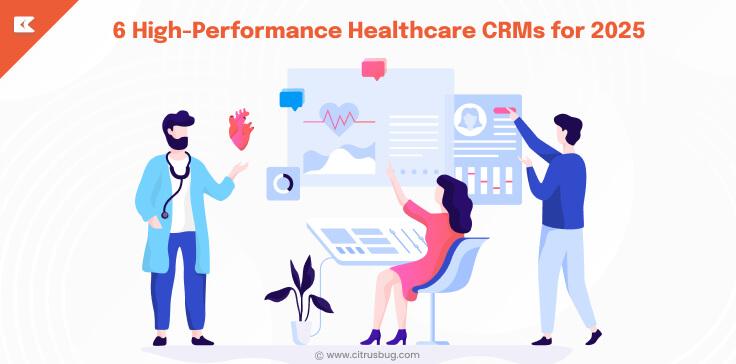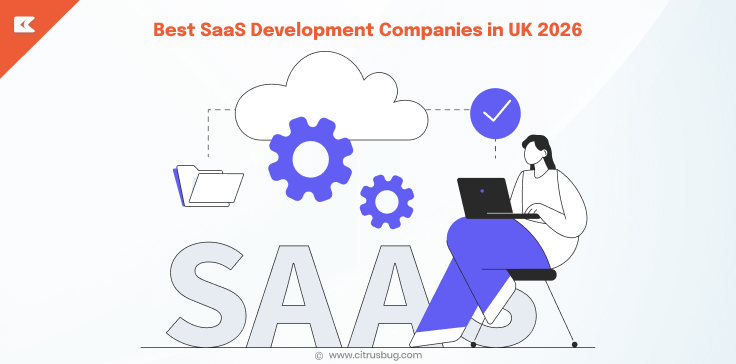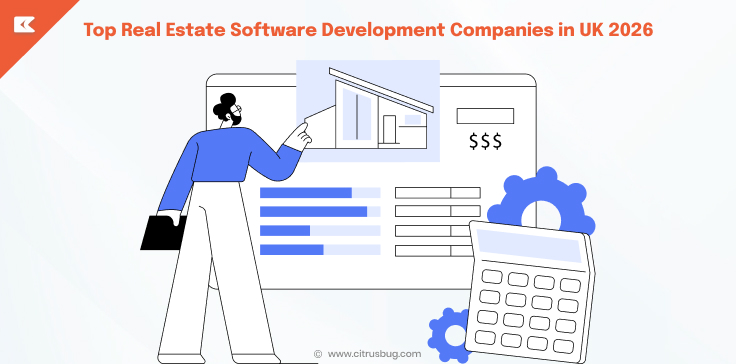
The healthcare sector, like any other service industry, relies heavily on customer relationships. As technology transforms the way organizations function, Customer Relationship Management (CRM) software has become an essential component for healthcare providers.
In this blog, we will take a closer look at what CRM means in the healthcare industry, why it is so important, list out the top healthcare CRMs, and key factors to choose them.
What is CRM in healthcare?
At its most basic, a CRM is a tool that allows businesses to manage their relationship with customers. In the healthcare industry, it is also called Patient Relationship Management (PRM). While standard CRMs used in sales or marketing, healthcare CRMs are tailored to meet specific medical industry needs, such as secure data handling, integration with Electronic Health Records (EHR), and patient engagement features.
It assists to have a holistic view of the patient – a 360-degree view of how they communicate, what their clinical data, and personal preferences, all within a secure, centralized platform.
Why is CRM important in healthcare?
The significance of CRM in the healthcare sector cannot be disputed. It safeguards patient records, treatment history, and communication history in a secure manner. Simultaneously, it also simplifies administration, such as scheduling an appointment, automated reminders, and follow-up, reducing the burden on staff.
Secondly, healthcare CRMs facilitate enhanced care coordination across departments and clinicians in assisting to guarantee a smooth patient experience. Ultimately, a superior healthcare CRM will lead to increased operational effectiveness and improved patient retention.
What Are the Key Factors to Consider Before Selecting the Best Healthcare CRM Software?
Choosing the right healthcare CRMs is a critical decision that can significantly impact the organization’s success. Here, we have mentioned the key factors to consider before selecting these healthcare CRMs.
User Ratings and Reviews
User feedback can expose what does and doesn’t work with a CRM in the wild. Using sites such as G2 and Capterra, healthcare providers can evaluate the performance, support and ease of use from other institutions’ perspectives. Pros and cons are also exposed through ratings, reviews and presentation of an unbiased view on the product before you decide to buy it.
Compliance and Security
Healthcare CRMs must be compliant with laws such as HIPAA. The software should be designed with strong security, such as encryption of data, secure access controls, audit trails, and a Business Associate Agreement (BAA). Uncompliant CRMs are a risk for patients and institutions. To help suggest providers in the right direction, we’ve rounded up healthcare CRM software that is HIPAA compliant, secure and have solid patient management, integration and analytics features.
Integration Capabilities
An effective healthcare CRM must seamlessly integrate with existing systems such as EHR/EMR, medical billing software, telehealth platforms, and lab systems. Effective integration will avoid the risk of creating disparate data sources and allow data to move effectively from one department to another.
User-Friendliness and Training
An intuitive and user-friendly interface is critical for staff adoption. If a system is difficult to navigate, it will likely be underutilized, and your investment will not yield its full potential. Look for healthcare CRMs that offer a clean, logical design and provide comprehensive training and support.
Customization and Scalability
Each health organization is different, and the healthcare CRM you choose must be able to accommodate your own workflows. Customizing dashboards, reports, and communication templates is very important. Also, think about the long-term scalability of the software. A good CRM should be able to scale with your practice if you are adding new staff, new locations, or increasing services without a complete overhaul.
Analytics & Reporting
In healthcare, data is an asset indeed. A great CRM comes with advanced analytics and reporting capabilities to deliver actionable insights, like tracking patient acquisition channels, patient satisfaction, referral patterns, and trends in patient data. Based on these insights, you can try making some data-driven decisions to ramp up your marketing activities, streamline operations, and improve patient care strategies.
Cost and Pricing Model
Healthcare CRMs are available in both free and paid versions, however, the price may change based on features offered, number of users permitted, and deployment options. A key factor to keep in mind when assessing a CRM for the healthcare industry is the hidden costs behind training, integration, and customization.
Based on this complete review of features, ratings, and market presence, here are some of the best healthcare CRMs for 2026.
6 Best Healthcare CRMs
1. Health Cloud
Health Cloud is a leading healthcare CRM built to create more personalized patient experiences. It displays the full spectrum of patient information from past medical history, care plans, and modes of communication. The platform easily integrates with EHRs, making data sharing smooth across departments.
Powered by analytics and insights from artificial intelligence (AI), Health Cloud enables providers to pinpoint care gaps and improve patient engagement without duplicating services. Its scalability is good for small practices and even better for the enterprise.
G2 Rating: 3.8
Capterra Rating: 4.6
Launch Year: 1999
Official Site: https://www.salesforce.com/eu/healthcare-life-sciences/health-cloud/
2. Zoho CRM for Healthcare
Zoho CRM serves a highly flexible and economical solution that has been altered to suit the needs of the healthcare industry. It offers a whole suite of tools for managing patient relationships, obviously starting from lead generation to appointment scheduling and subsequent follow-up after the visit.
The patient pipeline tracking helps manage the entire care journey, while the intelligent automations reduce everyday tasks that slow down the speed of the team. Plus, the social media integration within the platform, practices can build their online presence. Lastly, the custom reports provide a much clearer view of practice performance.
G2 Rating: 4.1
Capterra Rating: 4.3
Launch Year: 1996
Official Site: https://www.zoho.com/healthcare/
3. Veeva CRM
Veeva CRM is the market leader, but particularly designed for use by life sciences organizations like pharmaceutical and biotech companies. It’s the perfect solution for organizations and assists in managing relationships, simplifying regulatory compliance, and enhancing patient engagement.
The Veeva medical CRM provides critical capabilities for field teams, medical insights, stakeholder planning, and customer engagement. It’s also accessible via desktop or browser for full offline and online functionality.
G2 Rating: 3.9
Capterra Rating: 4.5
Official Site: https://www.veeva.com/
4. Zendesk for Healthcare
Zendesk is a customer service solution that has translated its tools to work for healthcare, particularly in handling patient inquiries. Its most effective features are an easy-to-use patient ticketing system that ensures no request is missed, and a sturdy knowledge solution for helping patients self-serve. It has excellent ratings on G2 and Capterra, it is praised for its user-friendliness and ease of implementation.
G2 Rating: 4.3
Capterra Rating: 4.4
Launch Year: 2007
Official Site: https://www.zendesk.com/in/healthcare/
5. PlayMaker Health
PlayMaker Health is a CRM software solution used by post-acute care providers. It is all about business expansion, referral management, and patient relationship monitoring. Its solutions assist organizations with enhancing relationships with referral sources and increasing operational efficiency.
PlayMaker Health is focused on a niche market and offers features uniquely designed for home health care, hospice, and other post-acute care providers.
G2 Rating: 3.5
Launch Year: 2015
Official Site: https://info.trellahealth.com/playmaker-acquisition-faq-cs-learn-more.html
6. HubSpot CRM
HubSpot CRM is a well-known platform celebrated for its free core product and user-friendly interface. The platform combines powerful patient marketing tools with automated email campaigns to keep practices growing steadily.
It excels at lead capture, automated communication, and tracking the patient journey from initial contact. Its high ratings on both G2 and Capterra speak to its ease of use and the value it provides to a wide range of businesses, including those in healthcare.
G2 Rating: 4.4
Capterra Rating: 4.5
Launch Year: 2014
Official Site: https://www.hubspot.com/products/crm
Conclusion
Selecting the ideal Healthcare CRM software is important for today’s medical practices to enhance patient relationships and automate their operations. From enterprise solutions like Health Cloud to beginner solutions like HubSpot CRM, all come with distinctive advantages depending on the type of organization.
For businesses that require customized solutions, hiring professional healthcare CRM software development experts to work on your system ensures that your system accurately mirrors your individual workflows, regulations, and growth objectives while best serving patients and streamlining operations.
FAQs
Q.1 How much does healthcare CRM software cost?
⇒ The cost to develop healthcare CRM software ranges from $15,000 to $150,000+. But it varies based on features, user count, and deployment type.
Q.2 Can healthcare CRMs improve staff productivity?
⇒ Yes, healthcare CRMs automate repetitive tasks like appointment reminders, follow-ups, and data entry. This reduces administrative workload and allows staff to focus more on patient care. Overall, it streamlines operations and boosts efficiency.
Q.3 How long does it take to implement a healthcare CRM?
⇒ Implementation depends on system complexity and customization needs. Simple setups can take a few weeks, while enterprise-level CRMs with multiple integrations may take several months. Proper planning ensures smooth adoption.
Q.4 What is the role of AI in Healthcare CRMs?
⇒ AI in healthcare CRMs help to customize patient engagement based on data, automate routine tasks for operational efficiency, and generate predictive analytics for proactive risk management.
Q.5 How does CRM help manage patient referrals?
⇒ A Healthcare CRM facilitates patient referrals by monitoring and coordinating referral data in one unified system. It enables healthcare professionals to easily forward patient information to specialists or other clinics, with seamless handoffs.





 SaaS Development
SaaS Development Web Application Development
Web Application Development Mobile Application Development
Mobile Application Development Custom Software Development
Custom Software Development Cloud Development
Cloud Development DevOps Development
DevOps Development MVP Development
MVP Development Digital Product Development
Digital Product Development Hire Chatbot Developers
Hire Chatbot Developers Hire Python Developers
Hire Python Developers Hire Django Developers
Hire Django Developers Hire ReactJS Developers
Hire ReactJS Developers Hire AngularJS Developers
Hire AngularJS Developers Hire VueJS Developers
Hire VueJS Developers Hire Full Stack Developers
Hire Full Stack Developers Hire Back End Developers
Hire Back End Developers Hire Front End Developers
Hire Front End Developers AI Healthcare Software Development & Consulting
AI Healthcare Software Development & Consulting Healthcare App Development
Healthcare App Development EHR Software Development
EHR Software Development Healthcare AI Chatbot Development
Healthcare AI Chatbot Development Telemedicine App Development Company
Telemedicine App Development Company Medical Billing Software Development
Medical Billing Software Development Fitness App Development
Fitness App Development RPM Software Development
RPM Software Development Medicine Delivery App Development
Medicine Delivery App Development Medical Device Software Development
Medical Device Software Development Patient Engagement Software Solutions
Patient Engagement Software Solutions Mental Health App Development
Mental Health App Development Healthcare IT Consulting
Healthcare IT Consulting Healthcare CRM Software Development
Healthcare CRM Software Development Healthcare IT Managed Services
Healthcare IT Managed Services Healthcare Software Testing services
Healthcare Software Testing services Medical Practice Management Software
Medical Practice Management Software Outsourcing Healthcare IT Services
Outsourcing Healthcare IT Services IoT Solutions for Healthcare
IoT Solutions for Healthcare Medical Image Analysis Software Development Services
Medical Image Analysis Software Development Services Lending Software Development Services
Lending Software Development Services Payment Gateway Software Development
Payment Gateway Software Development Accounting Software Development
Accounting Software Development AI-Driven Banking App Development
AI-Driven Banking App Development Insurance Software Development
Insurance Software Development Finance Software Development
Finance Software Development Loan Management Software Development
Loan Management Software Development Decentralized Finance Development Services
Decentralized Finance Development Services eWallet App Development
eWallet App Development Payment App Development
Payment App Development Money Transfer App Development
Money Transfer App Development Mortgage Software Development
Mortgage Software Development Insurance Fraud Detection Software Development
Insurance Fraud Detection Software Development Wealth Management Software Development
Wealth Management Software Development Cryptocurrency Exchange Platform Development
Cryptocurrency Exchange Platform Development Neobank App Development
Neobank App Development Stock Trading App Development
Stock Trading App Development AML software Development
AML software Development Web3 Wallet Development
Web3 Wallet Development Robo-Advisor App Development
Robo-Advisor App Development Supply Chain Management Software Development
Supply Chain Management Software Development Fleet Management Software Development
Fleet Management Software Development Warehouse Management Software Development
Warehouse Management Software Development LMS Development
LMS Development Education App Development
Education App Development Inventory Management Software Development
Inventory Management Software Development Property Management Software Development
Property Management Software Development Real Estate CRM Software Development
Real Estate CRM Software Development Real Estate Document Management Software
Real Estate Document Management Software Construction App Development
Construction App Development Construction ERP Software Development
Construction ERP Software Development







